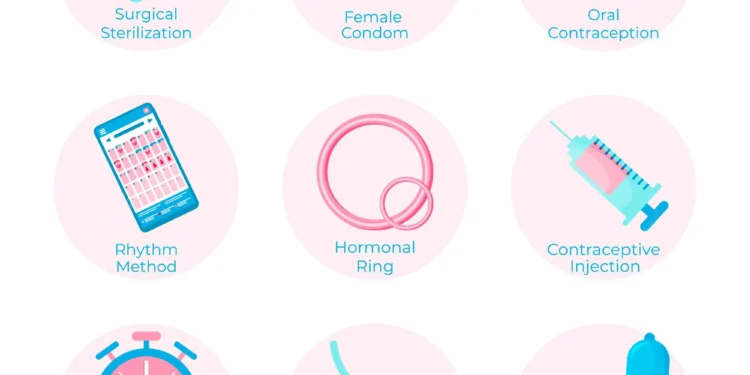Contraception is the ability to prevent unwanted pregnancy. But it’s not as simple as that. In fact, there are dozens of different methods you can use to avoid getting pregnant. Each one has its benefits and drawbacks, but when it comes to your future family, it’s worth weighing them all up. To help you choose the right birth control for your circumstances, here’s everything you need to know about contraception:
What is contraception?
Contraception is any intervention taken by a person that’s meant to prevent them from becoming pregnant. There are several common ways to do this.

Types of contraception
The most common methods of contraception are condoms, birth control pills, and IUDs. Different methods of contraception are also known as contraceptives because they prevent pregnancy. It’s important to note that not all methods of contraception prevent sexually transmitted infections (STIs).
- Condoms – This is the most common form of contraception because it prevents both pregnancy and STIs. Condoms are thin latex or polyurethane barrier contraceptive devices that are used during sexual intercourse to prevent pregnancy by blocking the entrance of sperm into the vagina. They also provide protection from STIs because there is no open area for the transmission of pathogens to occur.
- Birth control pills – Another option is the birth control pill. This is a long-term form of contraception that can be taken daily to prevent pregnancy. The pill works by inhibiting uterine contractions that lead to pregnancy. There are many different types of birth control pills as well, designed to treat specific health concerns, such as acne or irregular periods. Condoms and birth control pills are both highly effective methods of contraception. However, they have major drawbacks as well.
When is it necessary?
The most effective contraceptive methods are those used while you’re having sex. This is because they take advantage of the high chance of pregnancy during intercourse, which is why people get pregnant in the first place.
The other forms of contraception are less effective as they require you to be having sex every single day, for months at a time, in order to be effective. If you decide to use one of these less effective methods, you must be prepared to use it for the rest of your life.

Abortive methods of contraception
Abortive methods of contraception are methods that are used prior to having sex and therefore don’t provide any protection against pregnancy. This includes withdrawal, condoms, and the rhythm method. Withdrawal is the most commonly used abortive method of contraception. This is when a man simply stops having sex.
It’s very effective, but it has some huge drawbacks. First, it’s incredibly difficult to practice withdrawal, which makes it an unlikely choice for long-term birth control. Second, it’s a huge burden on men. They must worry about their partners getting pregnant, while they must worry about actually doing it.
Available forms of contraception
There are many different types of contraception available. This includes emergency contraception, long-term contraception, and reversible methods of contraception.
- Emergency contraception – This is a short-term form of contraception that you can use if you have unprotected sex, but you’re already on your period. One of the most popular emergency contraceptive methods is the copper IUD, which can be inserted up to 5 days after intercourse.
- Long-term contraception – There are a variety of long-term contraceptives available. This includes hormonal methods, like the birth control pill or the patch, as well as IUDs and implants. Permanent contraceptives like these require that you get a doctor’s appointment at least once per year in order to have them removed.
- Reversible methods – These include condoms, the withdrawal method, and the rhythm method. Condoms are very effective when used correctly, but they’re not permanent methods of birth control. A rhythm method is a temporary form of contraception that relies on a woman’s natural cycle to help her figure out when she’s most likely to get pregnant, at which point she uses other methods.

Pros and cons of different methods
The two most important things to keep in mind when considering the pros and cons of different methods of contraception are to talk to your doctor and to consider your own personal preferences.
- Hormonal methods – These include the birth control pill, the patch, the ring, and the injection. They have a small number of hormones, which help regulate the production of cervical mucus, making it harder for sperm to enter the uterus.
- Barrier methods – These include condoms, dental dams, and the female condom. They’re the most effective forms of birth control because they block both the penis and the vagina.
- Implantation – This is a rare form of contraception that involves implanting a fertilized egg in the uterus. The fertilized egg will grow into a fertilized uterus and later a baby.
Summary
The most effective forms of contraception are those that are used while having sex, such as condoms or birth control pills. These are also the least effective forms of contraception, with the withdrawal method being the worst. The other forms of contraception are less effective and typically require that you be having sex for months at a time, like the IUD or implants.
The most common forms of contraception are the birth control pill and condoms. There are several different types of contraception available, and it’s important to consider your personal preferences, doctor’s recommendations, and future goals when picking the right one for you.























